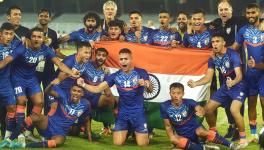How Two Young India Footballers Responded to a Match-Fixing Offer

Harold and Kumar (names changed) are professional footballers playing for current I-League leaders Minerva Punjab FC. Between 8:34 PM on Jan. 15, 2018, and 8PM on Jan 17, 2018, both players were offered money in exchange for inside information and influencing on-field performance.
The unidentified individuals, who made the advances, offered the players as much as Rs 30 lakh to fix I-League games. Both players immediately reported the approaches to club owner Ranjit Bajaj. Bajaj followed protocol and reported the incidents to the All India Football Federation’s integrity officer and posted the details on the Asian Football Confederation’s integrity app. The club, despite not having a precedent for such a situation, reacted absolutely by the book.
Bajaj spoke to NewsClick in detail about the timelines of the approach and what has happened since. NewsClick has accessed the official complaint lodged by the club with the federation and has also been shown the exchanges, all of which took place on social media platforms Facebook and WhatsApp, between the unidentified men and the players.
Harold and Kumar are young players, both under 25. Yet they displayed tremendous maturity in their handling of what was an extremely delicate situation. In return for their honesty, Minerva Punjab FC took the players out for a meal to a barbecue restaurant and handed them Rs. 10,000 each as an acknowledgement of their integrity. The two players spoke to NewsClick recently, going on record with the inside story for the first time.
Harold and Kumar come from very different environments. One grew up in a small town in India, the other in a big city in Africa. But they have football in common. It is what brought them together at the Minerva campus on the outskirts of Chandigarh, a long way from home. Neither ever had another profession in mind.
“My whole life is about football,” says Harold. “I come from a family where I was well brought-up and looked after. My father has always been my closest friend and he has been the biggest influence in my life. He is always around to help me choose between right and wrong. I am here to write my own story and make something for myself, my parents and the club I play for.”
Kumar says he has been raised to treat everything he does in connection with football in a professional manner. So, when the approach was made, the reaction was automatic. “Getting involved with this sort of stuff was never my choice,” he says. “I reported the incident immediately because I realised it can have a major impact on the club’s atmosphere and performance.”
For both players the first instinct was to go to Bajaj, the man who brought them to the club and is heavily involved in every aspect of its daily operations. “I did not know how the club would respond to what I was telling them, but I was sure it would be a positive response based on what Ranjit thought was the right thing to do,” Kumar adds.
The I-League may still call itself the top flight of Indian football, but its financial health is far from being in the black. The cash award for the winning club is Rs. 1 crore—only three times what each of these players was offered to influence matches.
Cameroonian forward Dipanda Dicka, revealed in public on Feb. 10 that he has still not received the Rs. 50,000 due to him for finishing as the league’s top scorer last season. The two young players in question here earn (approximately) Rs 70,000 and Rs 30,000 per month. They have no guarantee that salaries will go up, or how long their careers may last. Rs 30 lakh, for these boys and most other professionals playing in India, is a lot of money. Yet both players rubbished the idea of falling prey to temptation.
“This is the first time something like this has happened in my career,” says Harold. “With hard work and good performances from my side I can achieve something in football. I would never think of something like this as a shortcut because I am here for the love of the sport. I am here to script history and not to follow money.”
Kumar is similarly categorical. “I will never be tempted, no matter what the amount on offer,” he says. “I am a professional so I have no interest or intention either. Especially at this stage of my career when I am still developing.”
Kumar feels he has a lot to learn in the game but is optimistic about his future—a future that he knows would not be real if he had even engaged in the conversation any further. “Minerva is helping me a lot to achieve my dream of playing professional football. It is a great platform for me to open myself up to offers from bigger clubs in bigger leagues. I am grateful for that and see no reason to mess it up.”
It is a realisation both players share. Independently, they shut down the men making the approach, unequivocally, instructing them never to make contact again. One of the would-be fixers was persistent, though. He apologised for upsetting the player but, in the very next breath, asked if he might know any other players or coaches in the I-League who might be more amenable to striking a deal. Despite this brazenness, the players displayed remarkable restraint in their conversations. There was no anger or abuse from their end. Just a simple message: Not Interested.
We asked Harold and Kumar if there were any systems or processes that could be put in place so that others may be sheltered from having to face such twisted temptation.
They felt it was for those with expertise in these matters— the AIFF, club owners and the police— to find ways to combat fixing and protect players. Expectedly, though, the response from said officials has been sluggish.
Javed Siraj, a cop with CBI experience, acknowledged receipt of the complaint from Minerva Punjab but has not provided any further information on the subject of fixing in India. The federation says this is the first instance of a club—at any level in India—reporting a potential match-fixing approach.
NewsClick’s request for an interview with Siraj was turned down by the AIFF, saying Siraj was unwilling to comment on the subject at present. We will update this piece if he changes his mind. The Asian Football Confederation, which has considerable experience of fixing situations, has not even contacted the club after the incident was reported on the web application, according to Bajaj.
The Minerva players did, however, have words of advice for players who might find themselves in a similar predicament. “Stay focussed on what you are doing in life and don’t always be concerned about money,” says Harold. “My ambition is to be happy, have self respect and make those I love proud. With that in mind you cannot go wrong.”
Kumar agrees, but also feels individual define their own ethics. “If you think of yourself as a professional, you’ll always stay away from this sort of fishy business.”
Get the latest reports & analysis with people's perspective on Protests, movements & deep analytical videos, discussions of the current affairs in your Telegram app. Subscribe to NewsClick's Telegram channel & get Real-Time updates on stories, as they get published on our website.
























